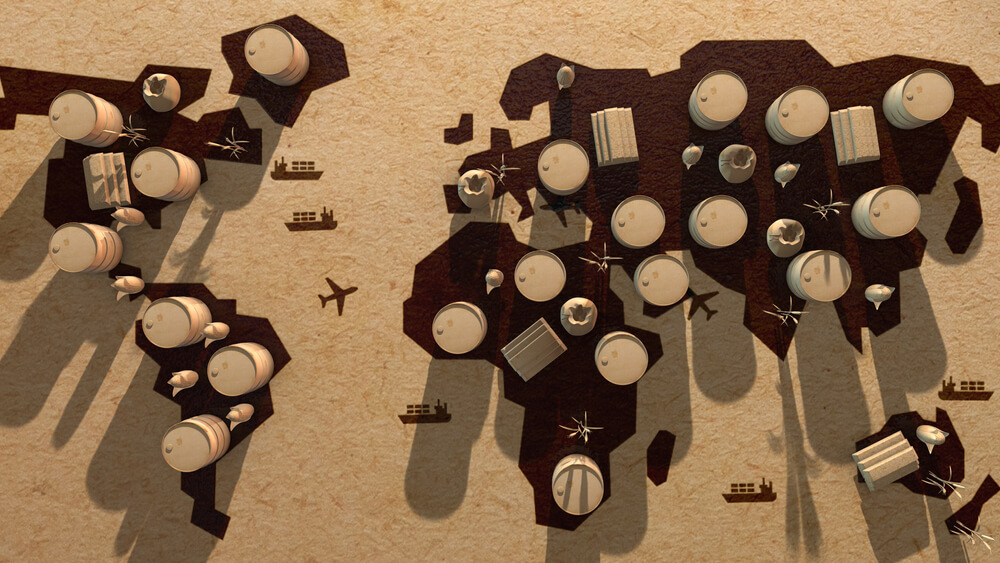The commodity market makes part of global financial markets. Generally speaking, the financial market is where buying and selling various assets takes place. To get to grips with the commodity market, let’s start with the commodity meaning definition. The commodity market represents the market where buying and selling raw products, i.e.commodities, occurs.
Today, there are around 50 commodity marketplaces trading with over 100 raw commodity products. The thorough answer to the question of what are commodity markets follows within the next lines.
What are Commodity Markets – Types of Commodities
Commodity products fall into two major groups: hard and soft commodities. The first group includes the natural resources that have to be extracted and mined, such as gold and oil. On the other hand, we have soft commodities, usually agricultural commodities such as wheat, soybean, or coffee.
Commodities represent basic goods that are exchangeable with other commodities of the same kind. These goods play an essential role in world economies and our everyday lives. The hard commodities with the highest trading volume on the market are crude oil, gold, lumber, natural gas, silver, platinum, copper. When it comes to soft commodities, the most traded are cotton, rice, oats, sugar, cattle, coffee, cocoa, corn, and soybeans.
The Types of Investors in the Commodity Markets
- producers who acquire futures contracts based on their production to protect themselves against future price fluctuations;
- hedgers who buy or sell raw materials to offset their trading risks;
- Speculative traders who rely on the leverage provided by derivative contracts
How Commodity Markets Work
Before industrial sectors can exploit commodities as finished or partially finished products, raw materials are traded on the financial market. These materials include agricultural products (wheat, soybeans, etc.), metals (gold, silver, etc.), and energies (petroleum, etc.).
The investors usually purchase the stocks or negotiate on commodities prices through specific contracts. These contracts include mutual funds, ETFs, index funds, swaps, options, mutual funds, and various derivative instruments. The most direct way of investing in commodity markets is through future contracts.
When it comes to the futures contracts, also called forwards, transactions result in payment and delivery at a later date. A producer can thus sell part of a commodity before the harvest or extraction.
This forward sale lets him know the selling price in advance, regardless of how market conditions change over time. For example, if a coffee farmer sells his crop at a May price, for delivery in July, he will either gain or lose money. He will either have protection from a possible fall in prices or harmed if they rise.
What is a Commodities Exchange?
The raw materials price lists show up in many commodities markets all over the world. They are also called commodities exchange markets, where trading commodities is executed through trading contracts. As we already said, the most direct way to trade commodities is through derivative contracts like “futures.”
These are highly leveraged financial instruments but benefit from a performance guarantee which is granted by a clearinghouse. The clearinghouses request the payment of guarantee deposits (“initial margins”) and the daily payment of debit margins (“margin calls”). The amount of margins is updated according to the price movement of the underlying commodity covered by the contract.
Leading commodities exchange markets
- Chicago Board of Trade (wheat, raw rice, oats, soybeans, etc.),
- New York Mercantile exchange (energy and metals),
- London BullionMarket (gold, silver)
- London Metal Exchange, the world biggest market for trading metals options and futures
- Tokyo Commodity Exchange (precious metals, oil, soft commodities)
Since its merger with the Chicago Board of trade, the Chicago Mercantile Exchange has been the world’s leading agricultural commodity market.
Every country has its own financial regulatory body for trading commodity futures. For instance, the Commodity Futures Trading Commission (CFTC) is in charge of commodity futures market regulations in the United States. This commission’s objective is to support competitive and transparent prices. It promotes the protection of consumers from calculating and fraudulent practices on the market.
Who Sets the Prices of Commodities?
The prices of commodities depend on many factors, just as market prices for stocks or cryptocurrencies, or any other asset. The main factor that affects their prices is supply and demand for certain commodities at the specific moment. For example, if the demand for crude oil increases due to some geopolitical events, its price will also go up. And vice versa – less demand means lower prices.
When it comes to agricultural commodities, weather conditions play an essential role in affecting the crops. The weather directly influences the supply of commodities such as corn, wheat, and soybeans.
Also, it’s essential to know that the commodities prices are expressed in US dollars. That means once the dollar’s value rises, traders need fewer dollars to purchase the same quantity of the commodity. Thus, this leads to a fall in the commodities prices.










